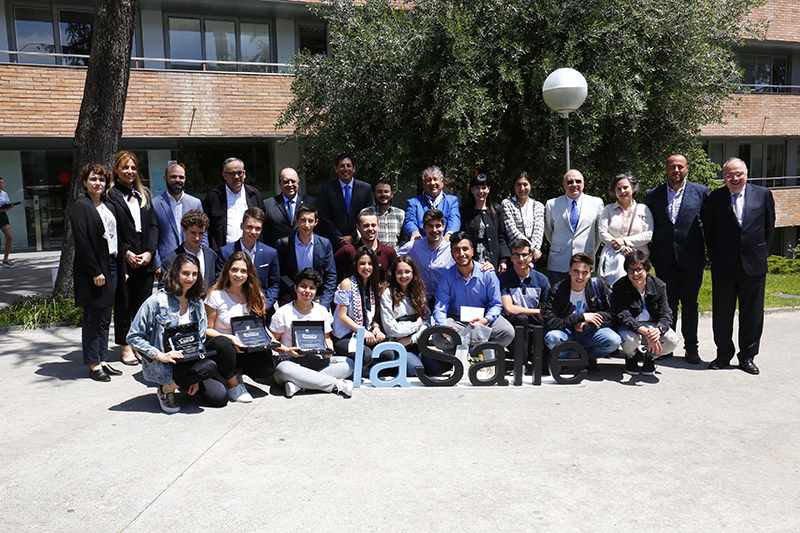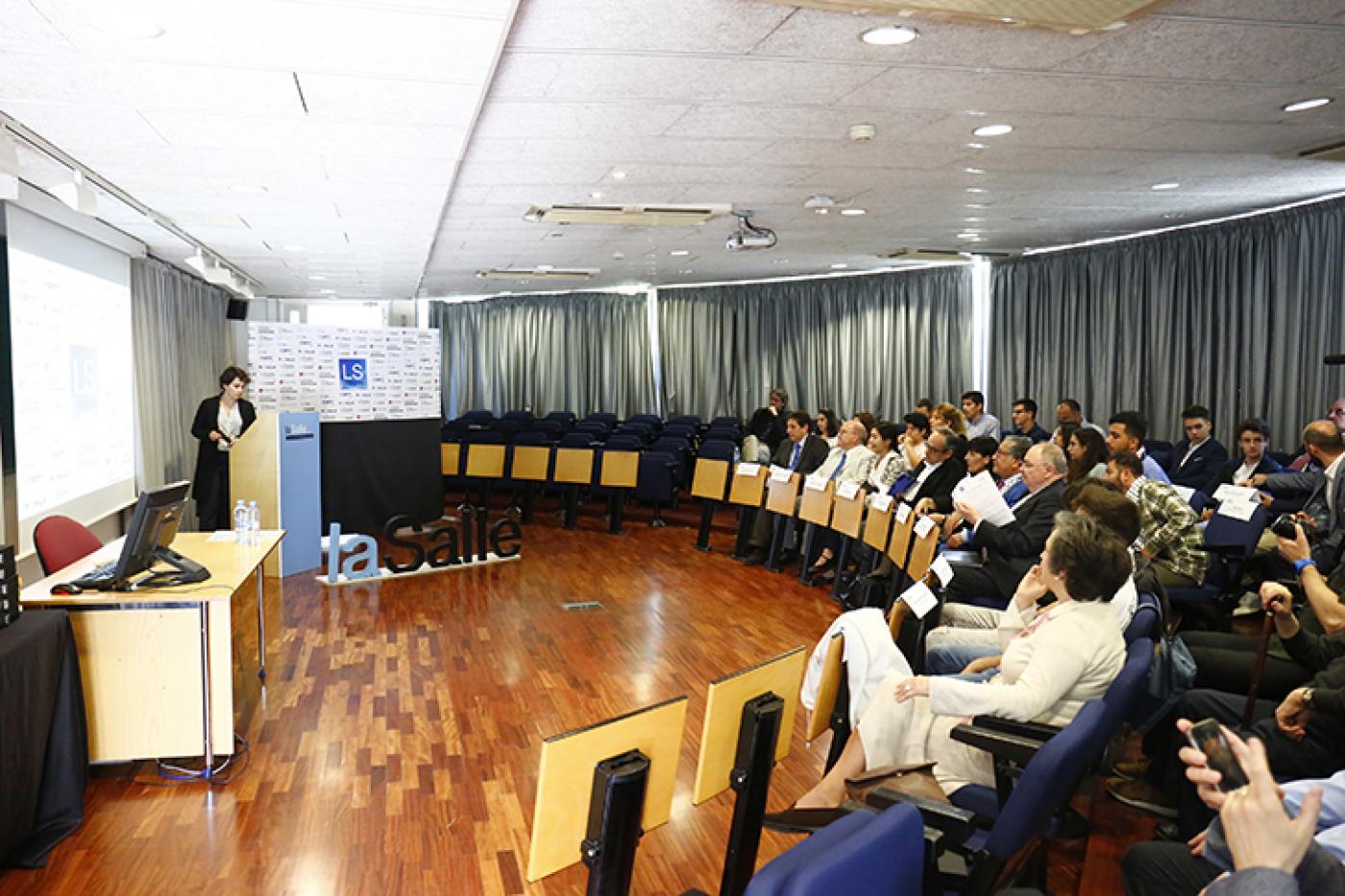The winners of the 9th edition of the LSdreams competition have been announced. The competition is an initiative by La Salle Universities and is open to pre-university La Salle educational centres in Europe and the Middle East, for 16 to 20 year olds. This year it has rewarded proposals from Spain, Portugal, Turkey, Egypt and Palestine. La Salle Bilbao was a particular highlight, having won in two categories, the First Prize and the ASSEDIL Prize. The main goal of the awards is to promote ethical values in research projects aimed at social improvement of their immediate surroundings. The winning projects deal with topics such as motorcycling safety, digital security, renewable energies, social integration, social services and health and welfare.
Another aim of the competition is to encourage young people to be sensitive to and to reflect on the moral and ethical implications of the five areas of knowledge our organisation deals with. The projects submitted must aim to improve their immediate surroundings with innovative research and development projects in the fields of architecture, engineering, health, business management and life and earth sciences.
In this year’s edition, the competition has awarded six first-place prizes, one ASSEDIL award, one extraordinary LSdreams award and four second-place prizes.
- In the field of Collaborative Projects, the First Prize and Extraordinary Prize were awarded to the ULTRAVISION group from the Saint-Michel Fransiz Lisesi centres in Istanbul (Turkey) and to La Salle Beit Hanina in Jerusalem (Palestine). The teams were made up by Eda Güçhan, Şila Polat, Asli Ünlüer, Jennifer Fairhurst and Amro Imad Sinokrot, Omar Khaldon Abu Saoud, Jennifer Dakkak Fairhurst, and the tutors Milena Kuyumciyam and Amer Qaysi.
As part of the same project category, a second-place prize has been awarded to the Highway to Health team by groups from: La Salle Barcelos in Barcelos (Portugal) and La Salle Palencia (Spain). The teams were made up by Ana Catarina Martíns Araújo, Diana Sofia Borges Fonseca and Sara Margarida Antunes Gomes, and the tutors José Correis Roque and David Saura López.
- In the field of Engineering, the First Prize was given to the group from La Salle Barcelos School (Portugal) for the “Body Bubble” project. The team was made up by the students José Nuno Correia Campos, Hugo José Campos Martins and Pedro da Silva Pereira, and their tutor José Eduardo Correia Roque.
This project consists of a full body inflatable suit for motorcyclists, which provides full body protection and is activated in just milliseconds, preventing injury and death. This suit is able to inflate in a matter of milliseconds, just like an airbag. However,it could protect all important parts of the driver's body, such as the spine, neck and even the thorax. Unlike similar existing products, this project provides full body protection, including a connection to the helmet and stabilisation of the lower part of the body.
The jury has also awarded a second-place prize to the group from Collège Saint-Marc of Alexandria (Egypt) for its project “SQRband: Virtual Smart Keychan”. The team consists of Kyrollos Youssef, Mohammed Amr and George Gabriel, and their tutor Ihab Ghobrial.
The project is based on the creation of a secure digital key fob stored on a wristband or other electronic device. It automatically opens doors, enter accounts or validate payments using a wireless connection. It can also be used to replace national identity documents and passports. All data is stored and transmitted securely using our implementation of the RSA protocol with additional security measures to prevent hackers from stealing useful data.
- In the field of Architecture, the Jury has awarded the First Prize to the group from St. Joseph Fransiz Lisesi School in Istanbul (Turkey) for their project: “Zephyr wall”. The team is made up by the students Irem Duru and Karya Erdoğan and their tutor, Laurent Chapdelaine.
This project is based on a fin wall connected to a converter that transforms the kinetic energy of wind and solar energy into electricity.
The jury also decided to award a second-place prize to the La Salle Beit Hanina group (College des freres - Beit Hanina) in Jerusalem (Palestine), for their project “Syning”. The team consists of the students Zein Zamamiri, Salma Abu Hummos and Rami Copty and their tutor Amer Qaysi.
The project aims to document, draw, research and propose a plan to develop an old building to make it modern, ecological, energy generating and beneficial to the local community. This building is located on one of the oldest and most famous streets in the city, on the outskirts of the old city of Jerusalem.

Winners of LSdreams of the year 2018
- In the field of Business Management, first place and the ASSEDIL prize was awarded to the group from La Salle Bilbao (Spain), for their “Social Empathy site” project. The team is made up of the students Idoia Gondra Pérez, Arrate Jace Izaguirre and Itziar Arrillaga Gonzalez, and their tutor Martxeli Mugica Jauregui.
Faced with the growing global trend of human migration including children and adolescents, difficulties arise as they adapt to schools in the welcoming countries. Because of their different levels of education, and in order to help include pupils and families, Empathy site has launched its project based on two pillars: a network to help welcome these migrants and a network to provide socio-educational support. This network is led by an open group of pupils, former pupils, parents and educators who receive immigrant pupils and families at their social enterprise.
The jury has also decided to award second-place prize in this category to the group from the San Juan Bautista school in Los Corrales de Buelna (Spain), for their project “Efficiency in the HR department”. The team is made up by Joana Herrero Santana, Andrea Merino San Segundo, Tania Garcia BouBoulis and their tutor Diana Ortiz Ruiz.
Bearing in mind that modern theories recognise the importance of efficient management of Human Resources, we know that in most companies the department responsible is saturated by bureaucratic administrative tasks, even having to resort to outsourcing such tasks to free up resources. This is why they wanted to find a more economically efficient alternative to allow the HR department to take on tasks that really add value to the company.
- In the field of Health, the First Prize was given to the group from La Salle Jerusalem (Palestine) for their project “Eduevolution”. The team consists of students Issam Shihabi, Christine Yousef Sabat and Omeros Samara and their tutor Afif George Amireh.
As Palestinian Jerusalemites, they face a variety of structural challenges and discriminations in their daily lives, from the challenges within their own Palestinian society to the challenges imposed on them by the occupation. Their neighbourhoods have little access to basic social services, unemployment rates are high and opportunities are limited. They also face social pressures within the Palestinian community; they are expected to conform to an image of what it means to succeed, which is often narrowly defined by material wealth, marriage and starting a family.
The jury has also awarded a second-place prize in this category to the group from La Salle Cordoba School (Spain), for its project “Bringing borders closer”. The team is made up of students Angela Miño Calero, Rebeca Sosa Lozano and Marta Garcia de Viguera and their tutor Rocío del Pilar Rodríguez Torres.
This project consists of the creation of booklets in three languages (Spanish, English and French) that will be sent to various underdeveloped countries. Based on basic hygiene information and exercises or games beneficial to physical health. There will be plenty of photographs and drawings for third world children and adults to help them understand. They are trying to solve the problem of misinformation in these countries by providing information they consider basic to their health and well-being.
- In the field of Life and Earth Sciences, the Jury has decided to award First Prize to the group from the Saint-Marc School in Alexandria (Egypt), for their project “Phyto-épuration”. The team consists of the students Marc Bondoly, Ahmed Hamdy and Pierre Bahgat, and their tutor Samy Medawar.
This project is based on using natural bacteria found in the root system of plants to purify water. Bacteria that need oxygen and do not emit odours that “eat” organic matter. They transform them into a mineral material that plants can assimilate. In return, it will provide water to the bacteria through their roots.
The jury has also awarded a second-place prize to the group from La Salle Bilbao (Spain), for their project “Natura”. The team consists of the students Ane Yagüe Viciola, Irati Alcubilla Tamayo and Itziar Arriaga Ruiz de Velasco, and their tutor Garbiñe Ibañez Canton.
Theirs is a project created by students to turn their school into an agent of change, a resilient school in their city, to work together to create a city for the people: open spaces with good air quality, low noise levels and no heat islands. Its value proposition focuses on uniting the need for environmental improvement with the social inclusion of groups based in their neighbourhood. It is an integrative, inclusive project.
The winning teams, in each of the areas of knowledge proposed by the organisation, will travel to Rome on 25, 26, 27 and 28 April 2019 to collect their prize.
